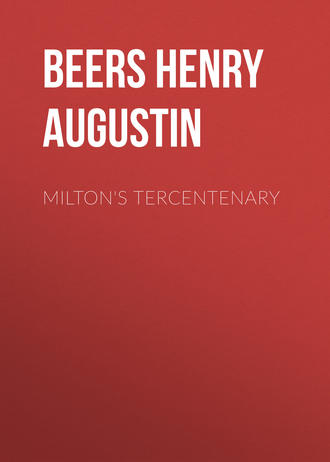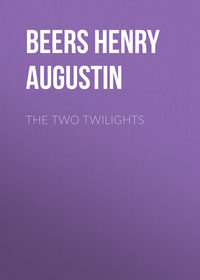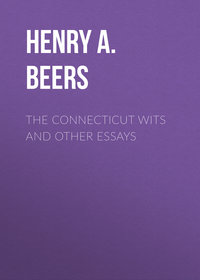 полная версия
полная версияMilton's Tercentenary
And in Paradise Regained he even disparages his beloved classics, preferring the psalms of David, the Hebrew prophecies and the Mosaic law, to the poets, philosophers and orators of Athens.
The Puritans were Old Testament men. Their God was the Hebrew Jehovah, their imaginations were filled with the wars of Israel and the militant theocracy of the Jews. In Milton's somewhat patronizing attitude toward women, there is something Mosaic – something almost Oriental. He always remained susceptible to beauty in women, but he treated it as a weakness, a temptation. The bitterness of his own marriage experience mingles with his words. I need not cite the well-known passages about Dalilah and Eve, where he who reads between the lines can always detect the figure of Mary Powell. There is no gallantry in Milton, but a deal of common sense. The love of the court poets, cavaliers and sonneteers, their hyperboles of passion, their abasement before their ladies he doubtless scorned as the fopperies of chivalry, fantastic and unnatural exaggerations, the insincerities of "vulgar amourists," the fume of
" – court amour,Mixt dance, or wanton mask, or midnight ball,Or serenate which the starved lover singsTo his proud fair, best quitted with disdain."To the Puritan, woman was at best the helpmate and handmaid of man. Too often she was a snare, or a household foe, "a cleaving mischief far within defensive arms." L'Allegro and Il Penseroso are the only poems of Milton in which he surrenders himself spontaneously to the joy of living, to "unreproved pleasures free," with no arrière pensée, or intrusion of the conscience. Even in those pleasant Horatian lines to Lawrence, inviting him to spend a winter day by the fire, drink wine and hear music, he ends with a fine Puritan touch:
He who of these delights can judge, yet spareTo interpose them oft, is truly wise.""Dost thou think, because thou art virtuous, there shall be no more cakes and ale?" inquires Sir Toby of Shakspere's only Puritan.
"Yes," adds the clown, "and ginger shall be hot in the mouth, too." And "wives may be merry and yet honest," asserts Mistress Page.
It is not without astonishment that one finds Emerson writing: "To this antique heroism Milton added the genius of the Christian sanctity * * * laying its chief stress on humility." Milton had a zeal for righteousness, a noble purity and noble pride. But if you look for saintly humility, for the spirit of the meek and lowly Jesus, the spirit of charity and forgiveness, look for them in the Anglican Herbert, not in the Puritan Milton. Humility was no fruit of the system which Calvin begot and which begot John Knox. The Puritans were great invokers of the sword of the Lord and of Gideon – the sword of Gideon and the dagger of Ehud. There went a sword out of Milton's mouth against the enemies of Israel, a sword of threatenings, the wrath of God upon the ungodly. The temper of his controversial writings is little short of ferocious. There was not much in him of that "sweet reasonableness" which Matthew Arnold thought the distinctive mark of Christian ethics. He was devout, but not with the Christian devoutness. I would not call him a Christian at all, except, of course, in his formal adherence to the creed of Christianity. Very significant is the inferiority of Paradise Regained to Paradise Lost. And in Paradise Lost itself, how weak and faint is the character of the Savior! You feel that he is superfluous, that the poet did not need him. He is simply the second person of the Trinity, the executive arm of the Godhead; and Milton is at pains to invent things for him to do – to drive the rebellious angels out of heaven, to preside over the six days' work of creation, etc. I believe it was Thomas Davidson who said that in Paradise Lost "Christ is God's good boy."
We are therefore not unprepared to discover, from Milton's Treatise of Christian Doctrine, that he had laid aside the dogma of vicarious sacrifice and was, in his last years, a Unitarian. It was this Latin treatise, translated and published in 1824, which called out Macaulay's essay, so urbanely demolished by Matthew Arnold, and which was triumphantly reviewed by Dr. Channing in the North American. It was lucky for Dr. Channing, by the way, that he lived in the nineteenth century and not in the seventeenth. Two Socinians, Leggatt and Wightman, were burned at the stake as late as James the First's reign, one at Lichfield and the other at Smithfield.
Milton, then, does not belong with those broadly human, all tolerant, impartial artists, who reflect, with equal sympathy and infinite curiosity, every phase of life: with Shakspere and Goethe or, on a lower level, with Chaucer and Montaigne; but with the intense, austere and lofty souls whose narrowness is likewise their strength. His place is beside Dante, the Catholic Puritan.
1
Mr. Charles Francis Adams informs me that a letter of inquiry sent by him to the Evening Post has brought out three or four references to Milton in the Magnalia, besides other allusions to him in the publications of the period. Mr. Adams adds, however, that there is nothing to show that Paradise Lost was much read in New England prior to 1750. The Magnalia was published in 1702.



